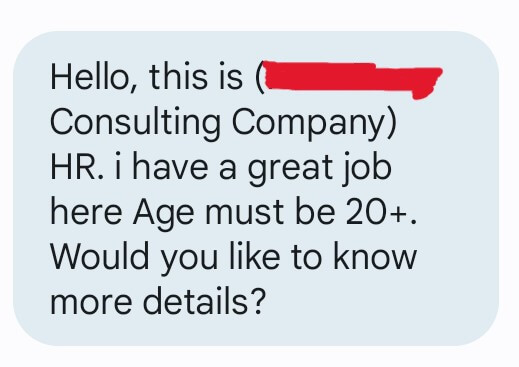We’ve all seen them.
Job offers from Elizabeth at The World’s Biggest Recruitment Firm—or some other company you’ve literally never interacted with—promising great wages for easy, remote work. But you’re not fooled—you’ve seen so many of these, it’s easy to just hit that delete button and block the sender. Annoying, but easy.
And while some of these scams will be easy to spot, it only takes one mistake before your personal information could be at risk. And scammers are always looking for new, sneakier ways to get your info and $$$.

That’s why you should know the red flags to spot them at a glance.
Remember: legitimate recruiters see scam postings as a problem for their business. Any legitimate recruiter will:
- Have proof that they are the real deal
- Will be happy to share it with you
Anyone who can’t is trying to take advantage of you.
At Raise, any recruiter will be able to show you the real posting from our verified website, and will also be able to show you their verified LinkedIn page.
How to Avoid Job Scams
If you’re not sure if you’re dealing with a scam or not, here are a few tips to help you stay ahead of all the scams.
1. Be careful with any communications that are unsolicited
Texts and emails from companies that you have never applied to or heard of should be approached with caution.
Make sure the recruiter is able to explain where your contact information came from, and beware anyone who asks you for money/personal information.
“Watch out for things that are missing—if they only give a first name (not full name), or don’t include a job title or contact info (like phone and email) it might not be legitimate” Heidi McHugh, Recruiter
2. Follow job postings back to company pages where possible.
Most job opportunities can be found on company websites. Even if you find a job on Indeed, or google jobs, the company advertising will typically have a posting on their own website. So while a scammer could post a fake version of a job on Indeed—it will often be traceable back to a real website.
At Raise, all of our real jobs can be found at raise.jobs
If you’re not sure about a job, try searching the company name and see if you can find the job on their website, and apply there.
3. Scams will often use predictable tactics to make you rush your decisions
Like any scam, fake recruiters will try to convince you to act quickly so that you don’t have time to think—they might tell you there is only one opening and they have a lot of applicants. Or they might say they are the hiring manager that you won’t get the job if you apply on the website.
These tactics try to distract you from what’s important—that there is probably something fishy about this opportunity that won’t stand up to scrutiny.
4. If you’re ever not sure, ask to speak with a manager, support team, or HR representative.
“Look up the company online and call to confirm the job is real; the admin team fields lots of these calls and emails. If you’re not sure, ask!” – Cassandra Sturk, Community Manager
Legitimate companies will always have a channel for you to escalate concerns and prove their postings are real. They can also provide a safe channel for you to apply to jobs (maybe their LinkedIn page, Indeed page, or their website).
5. Keep an eye out for spelling and grammatical mistakes in job ads and messaging
It is easier than ever to come up with correct spelling and grammar thanks to AI, but there can still be some inconsistencies in formatting and grammar (particularly if it has been translated).
If there is something that seems off, it could be suspicious.

6. Watch out for domain spoofing
Scammers have gotten very good at making fake links look real. Make sure to check the spelling and suffixes (ends) of website links to ensure they are legitimate (raiserecruting.com, or raiserecruiting.org are both spoofs of our real website, raisrecruiting.com)
“Check the email address! Real recruiters don’t work from hotmail addresses!” – Scott Russell, Learning and Experience Design
7. Never transfer money to a potential employer for any reason
While recruitment firms do earn a fee for hiring, that money comes from companies, not candidates. If someone asks you for a fee, or banking information without an interview, contract, and proper onboarding process, it’s a scam.
Recruiters may ask you to fill out a Right to Represent form (RTR), but this asks for your agreement to work with Raise, not for any personal information.
8. Trust your gut
If you’ve ever had an interview or worked a job, you already have a pretty good idea of what standard HR practices look like. If something seems off, you’re probably right!
If you’re not sure how to navigate the world of suspicious job ads, work with a trusted recruiter like Raise.
Raise.jobs is the perfect place to look for work—all our job postings are legitimate and we have a dedicated support team that is happy to answer any of your questions or concerns about our job posts.





